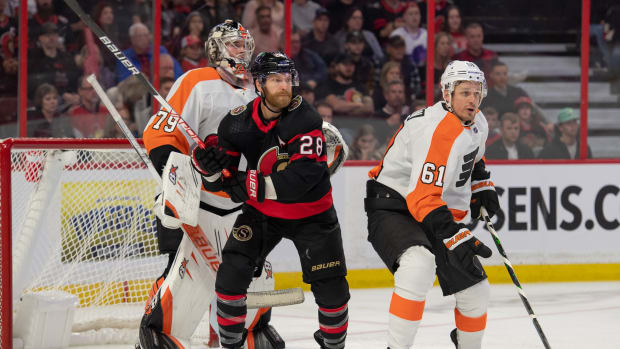This weekend, Ottawa Senators star forward Claude Giroux will return to Philadelphia for the first time since he was traded from the Flyers in March of this year.
The former Flyers captain spent nearly 14 seasons with Philly, but it was presumed at the time – and it turned out to be accurate – that the 34-year-old was not interested in another Flyers rebuild. So, as painful as it was for Philadelphia fans to see Giroux in another team’s uniform, he was dealt to the Florida Panthers in a multi-asset trade that brought young forward Owen Tippett, a third-round draft pick in 2023 and a first-rounder in 2024.
Considering the Flyers could’ve been left with nothing to show for Giroux if he’d remained with the team and left for greener competitive pastures this past summer as an unrestricted free agent, Philly did well in acquiring assets for the present and future.
The 23-year-old Tippett has gotten off to a strong start, with three goals and five points in seven games this season. On a Flyers team that has a long way to go before becoming a legitimate Stanley Cup playoff contender, Tippett has room to grow his game and evolve into a top power forward. He’ll be part of the franchise for the foreseeable future, and the other two assets Flyers GM Chuck Fletcher landed could become important pieces of the puzzle as well. All of this, essentially for a rental of Giroux in Florida, and now the Panthers have nothing to show for it.
But the most important lesson regarding the end of Giroux’s days in Philadelphia is for NHL teams currently weighing the pros and cons of moving on from longtime cornerstones. It may hurt in the moment to say goodbye to an athlete who spent his prime years with one particular team, but in the big picture, it always makes more sense to move a soon-to-be-UFA rather than hang onto him for sentimental reasons.
The best example of what can happen when a player digs in their heels and stays with a team until he can leave as a UFA is still the end of star center Mats Sundin’s career with the Toronto Maple Leafs.
Sundin was rightfully beloved in Toronto over his 13 years as a Leaf, but in the 2007-08 campaign, as the Buds stumbled toward their third consecutive season out of the playoffs, there was a golden opportunity for the Leafs to trade Sundin to a Cup frontrunner and jump-start a rebuild. Instead, Sundin held hard to his no-trade clause, telling the world he didn’t believe in the idea of being a rental.
There’s no question Sundin’s stance was admirable in many respects, but he left Toronto that summer to sign with Vancouver, and the Leafs were left with nothing (other than his salary cap space, which isn’t a total loss). In the macro view, it could’ve been beneficial to Sundin and Toronto for him to be moved, and Sundin likely still could’ve controlled where he wound up.
Speaking of Vancouver – the Canucks currently are in a similar situation with star forward Bo Horvat. The 27-year-old is leading Vancouver in goals (12) this year, but he’s also going to be a UFA this coming summer. Many believe that, even with a slight rise in the salary cap, the Canucks are going to be hard-pressed to sign Horvat to a long-term contract extension, and even if they did have the financial wherewithal to retain Horvat, why would you want to keep the whole team together given how poorly they’ve played as a unit this year?
Horvat doesn’t have a no-trade clause, so Canucks GM Patrik Allvin can generate a bidding war for his services relatively easily. Whether it’s a team that sees Horvat as a one-year rental, or a key component for the next seven or eight years, he could land Vancouver a tremendous package of prospects and draft picks. To many, that type of deal makes more sense than another year of Horvat spinning his wheels on a non-playoff organization.
Giroux’s return to Philly this weekend undoubtedly will be sentimental, but the Flyers made the cold-blooded move that was best for the franchise, and now, they’re deeper, younger and better-positioned for the future. The Canucks need to be just as sober when they project where they’ll be in their competitive cycle, and they should arrive at the conclusion they can be stronger over the long haul with the assets Horvat would bring in a trade than they would with the same core of players who just can’t win more often than not.
Otherwise, Vancouver’s road back to respectability could be even longer than it already looks to be. It may hurt to see Horvat playing for another team, but the alternative isn’t particularly attractive, either. Going the route that the Flyers went with Giroux is probably best for all involved.



